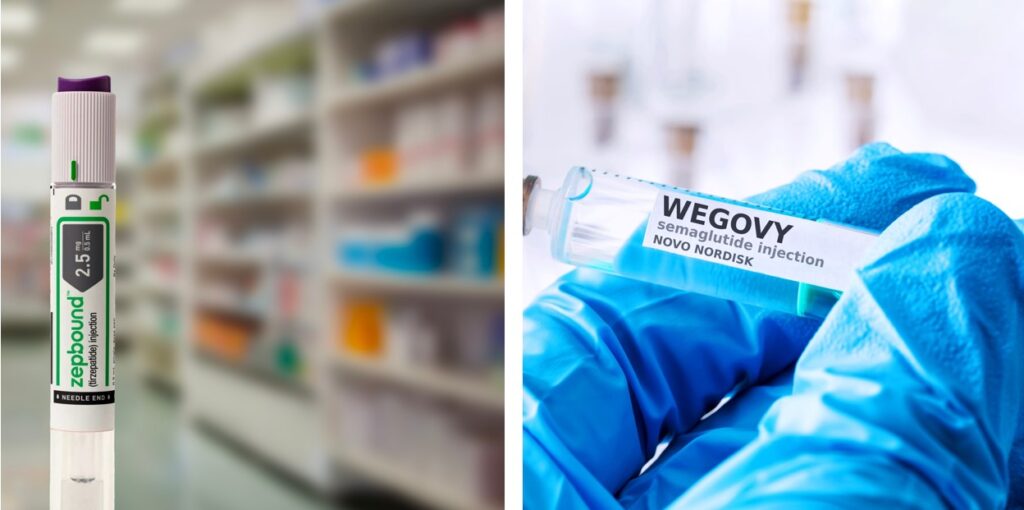In a highly anticipated head-to-head trial of Eli Lilly’s Zepbound (tirzepatide) and Novo Nordisk’s Wegovy (semaglutide), Zepbound has come out on top as it helped trial participants lose significantly more weight than Wegovy over an 18-month period.
Patients treated with Zepbound achieved an average weight loss of 20.2 percent of their body weight, compared to 13.7 percent for those on Wegovy. This amounted to Zepbound being 47 percent more effective than Wegovy in helping patients lose weight.
The data figured into an average weight loss of 50.3 pounds (22.8 kg) for patients on Zepbound and 33.1 pounds (15 kg) for those who received Wegovy.
The blockbuster GLP-1 drugs have been battling it out in the highly lucrative obesity drug market, which is expected to hit $100 billion by 2030.
While both semaglutide and tirzepatide have a glucagon-like peptide-1 (GLP-1) agonist component, tirzepatide also acts as an agonist of the gastric inhibitory polypeptide (GIP) hormone; this serves as a differentiator between the two and could explain tirzepatide’s stronger weight loss effects.
The SURMOUNT-5 Phase IIIb double-blind, randomized study involved 751 participants from the US and Puerto Rico with obesity or overweight conditions with at least one weight-related medical problem and without diabetes. It evaluated the comparative effectiveness and safety of Zepbound and Wegovy over a 52-week treatment period.
Related: Eli Lilly’s Tirzepatide Shows Promise for Keeping Prediabetic Patients Diabetes-Free
Participants in the trial were randomly assigned to receive either Zepbound, Wegovy or a placebo, with results measured by weight loss percentage and improvements in metabolic health markers.
At 72 weeks, Zepbound topped Wegovy on both the primary endpoint and all five key secondary endpoints, which included reductions in waist circumference, blood glucose levels and markers of cardiovascular risk.
Specifically, in a key secondary endpoint of 25 percent weight loss, 31.6 percent of participants who received Zepbound hit this mark compared to 16.1 percent of those on Wegovy.
Both drugs were generally well-tolerated, with similar profiles of mild-to-moderate side effects such as nausea, diarrhea and vomiting. However, Zepbound had a slightly lower discontinuation rate due to adverse effects.
“Given the increased interest around obesity medications, we conducted this study to help health care providers and patients make informed decisions about treatment choice,” said Leonard C. Glass, MD, FACE, senior vice president of global medical affairs at Lilly Cardiometabolic Health in a news release.
“We are thrilled that today’s findings showed the superior weight loss of Zepbound, which helped patients achieve 47 percent more relative weight loss compared to Wegovy. Zepbound is in a class of its own as the only FDA-approved dual GIP and GLP-1 receptor agonist obesity medication, and it’s changing how millions of people manage this chronic disease.”
In the US, tirzepatide is marketed as Zepbound for obesity and weight loss treatment, and as Mounjaro for type 2 diabetes. Novo’s semaglutide is marketed as Wegovy for adults with obesity or overweight and as Ozempic for the treatment of type 2 diabetes.
Lilly says tirzepatide is the first and only approved dual GIP and GLP-1 receptor agonist treatment to reduce excess body weight and maintain weight reduction long-term in combination with diet and exercise.
Lilly’s trial results are not surprising given that other clinical trials had already indicated Zepbound’s greater effectiveness for weight loss over Wegovy.
In Lilly’s pivotal trial that backed Zepbound’s approval, participants had an average body weight loss of 21 percent over 72 weeks, while Novo’s Wegovy study that led to its approval showed an average weight loss of 15 percent in a 68-week period.
With obesity rates continuing to rise globally, the demand for effective treatments is at an all-time high. Zepbound’s promising results position Eli Lilly as a solid competitor to Novo Nordisk in the obesity market, which has been dominated by Wegovy since its approval in 2021. Semaglutide was first approved by the US Food and Drug Administration (FDA) as Ozempic for the treatment of type 2 diabetes back in 2017.
Tirzepatide was approved as Mounjaro in 2022 and as Zepbound in 2023.
While Novo got a head start in the GLP-1 market with its earlier approvals, analysts predict that Zepbound’s superior efficacy and tolerability will drive significant market share gains for Lilly, potentially surpassing Wegovy in global sales.
There are other potential GLP-1 entrants on the horizon, including Amgen’s MariTide, a bispecific GLP-1/GIP-1 antibody-peptide conjugate that posted positive Phase II trial data recently that showed it could result in a weight loss of 20 percent in participants with obesity or overweight without type 2 diabetes. Viking Therapeutics also shared promising data from a Phase II trial of its GLP-1/GIP candidate earlier this year.
As dual GLP-1/GIP-1 agonists, both are positioned to rival Lilly’s tirzepatide.
Lilly plans to further analyze the SURMOUNT-5 trial results, which the company said are expected to be published in a peer-reviewed journal and presented at a medical conference next year.
If you want your company to be featured on Xtalks.com, please email [email protected].












Join or login to leave a comment
JOIN LOGIN